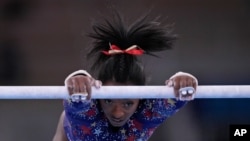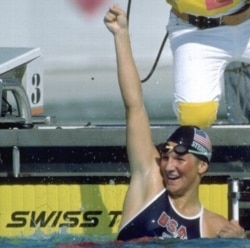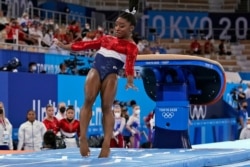Swimming gold medalist Carrie Bates recalls the sensation of adrenaline and excitement, shot through with fear, that swamped her body when she first stepped onto the Olympic stage at the age of 16.
“People like myself and others dream about it from the time they're little girls,” she says. “And then, when it comes to fruition, and you walk on and you see those Olympic rings and the size of the venues and really what's at stake — you know, most of us, our careers can be made by one-100th of a second or broken by one-100th of a second — so the pressure and the anxiety, the performance anxiety, can be very, very intense.”
Bates, who won three gold medals at the 1984 Summer Games in Los Angeles, is one of the few elite athletes who has some idea of the stress and emotions that run through athletes like gymnast Simone Biles, who withdrew from some Olympic events at the Games in Japan, and tennis ace Naomi Osaka, who left the prestigious Wimbledon tournament in June. Both women cited the need to take care of their mental health.
USA Gymnastics announced today that Biles plans to compete in the balance beam final on Tuesday, a week after withdrawing from all other events.
On her Instagram, Biles told fans that her "mind and body are simply not in sync," explaining that she’s been plagued by a mental phenomenon known as the “twisties.”
“Which is basically losing your spatial awareness in air, mid-flight, in the middle of a skill,” seven-time Olympic medalist gymnast Shannon Miller told NPR. “That is a very important thing for a gymnast, in particular, to be flying 10, 15 feet above the air, twisting, turning, flipping, and not know where you are. That could lead to devastating consequences.”
Miller, who competed in the 1992 and 1996 Games, said mental blocks aren’t something you can power through. She pointed out that Biles doesn’t necessarily have the added safety of working through the problem at a training facility with extra mats and foam to break her falls.
“If you have a physical injury and you're going into competition, you have to know your body well enough to know, ‘Is this an injury I can push through, and it might hurt, but I'm going to be safe?’” Miller said. “And it's the same with mental blocks, you have to know when that moment is that you can push through and when that moment is where it is not going to happen and you're putting yourself at further risk.”
Bates, the swimmer, cannot imagine ever being allowed to miss a competition for mental health reasons back when she competed.
“I would argue that this will be one of the greatest parts of Simone's legacy in this sport, and in sports in general,” Bates says. “She literally told the world that it's OK to not be OK, and when you're not OK, you need to take care of yourself both physically and mentally.”
An added mental health pressure for top athletes, many of whom have trained in their sport since childhood, is that their sense of self is completely wrapped up in their sport.
“It becomes very difficult for these individuals to understand where they are in the world and to define themselves differently when they feel like they can't do their sport,” says Rachel Goldman, a clinical psychologist affiliated with the New York University School of Medicine, who has worked with college athletes and dancers. “The thought process that happens [is] that must mean that they're a failure, that must mean they’re a nobody.”
On her Twitter account, Biles alluded to self-identity issues when she tweeted that the outpouring of love and support she received made her realize that she is “more than my accomplishments and gymnastics which I never truly believed before.”
Bates acknowledges that she defined herself by her sport and was devastated when she failed to make the U.S. Olympic team four years after her victories at the 1984 Los Angeles Games. She remembers the headlines that screamed, "She can't hold it together” and “She can't keep up with her past.”
“I had no Plan B going into Olympic trials. I had never considered I wouldn't be on that Olympic team. And so, when it happened, I was very lost,” Bates says. “Truthfully, it was the first time I remember drinking with a real intensity to not feel, and it really left me feeling shame … I think my perception of who I am, who I was, changed from … hero to zero. That's pretty much where my mental health went.”
Bates battled alcoholism after leaving the sport and now works as an outreach coordinator for the Hazelden Betty Ford drug and alcohol treatment centers. She hopes parents of tomorrow’s elite athletes will focus on developing the whole person, rather than just the budding sports superstar.
“Talk about all the other amazing things that make up these kids as people, as little human beings, rather than just sports because, at the end of the day, sports do end,” she says.
While athletes like Biles, Osaka and Olympic swimming champion Michael Phelps set an example by speaking up about mental health, Goldman says maybe coaches should rethink encouraging athletes to “power through.”
“Somebody could be like, ‘You know what, let’s just take a breath,’” Goldman says. “Maybe instead of saying ‘Let's suck it up,’ [say] ‘Breathe for a second, maybe you need a timeout, why don't you take a breather?’”






